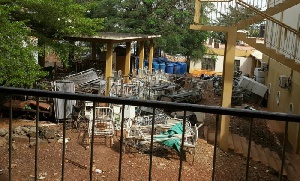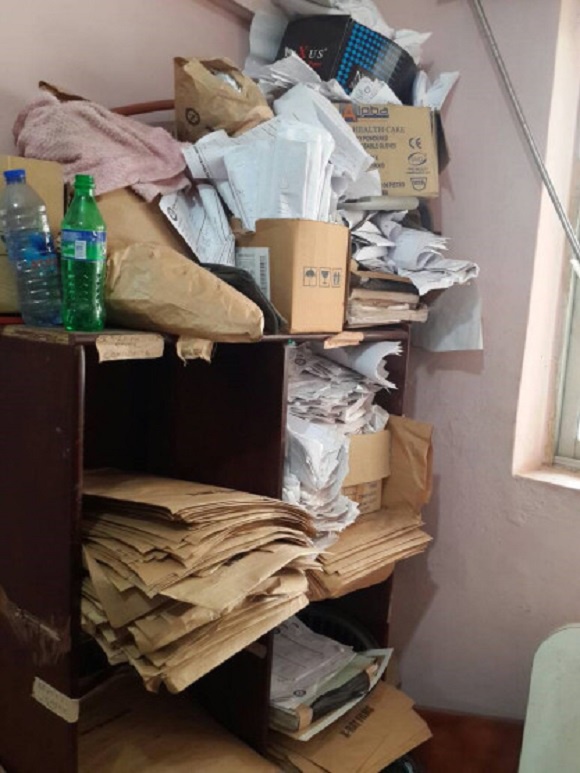 Abandoned broken hospital beds rusting away
Abandoned broken hospital beds rusting away
The fabric of any meaningful life is woven with the treads of quality learning; for that reason, civilization’s chief purpose is to raise everyone to be the best they could possibly be. In effect, the best measure of education must visibly promote beauty, quality of life, and longevity. It is with such notions that one must appreciate the essence of this World Bank 2018 report.
Also, for any report to help realise education’s promise, it must be handy for the users: the narrative, then, has to shift from mere abstractions to concrete examples, with cause and effect as one reasonable measure for understanding. Quality education is not to be sneezed at: it is really about life and death.
It happened that I had the World Bank report with me when I took an elderly parent to a major regional hospital right here in Ghana. In between the patient being attended to, and waiting for receipts and procedures, I read the report.
The Korean example
In a foreword to the report, the president of the World Bank group, Jim Yong Kim, wrote: “Education and learning raise aspirations, set values, and ultimately enrich lives.” He cited the Republic of Korea where he was born as a good example of how education can play the important roles.
He said, “After the Korean War, the population was largely illiterate and deeply impoverished. [But] Korea understood that education was the best way to pull itself out of economic misery, so it focused on overhauling schools and committed itself to educating every child – and educating them well.”
He continued: “But providing education is not enough. What is important, and what generates a real return on investment, is learning and acquiring skills. This is what truly builds human capital … Schooling without learning is a terrible waste of precious resources and of human capital … this is the case in many countries stuck in low-learning traps.”
The low-learning traps
The efficient practical skills lacking in our educational system was quite evident at the hospital. To begin with, the X’ray machine in a particular unit had broken down – very likely from the lack of periodic maintenance or the skill to repair it. So the operational machine now serving a larger number of patients had become a bottle neck, drawing a long cue of sick people. The X’ray and other files were in a heap of disorder (see picture), and it is anyone guess how any document could be retrieved in a timely manner if ever. So why is the education system not pushing digitized filing and retrieval of documents?
The toilets lacked water for flushing so the stench paraded the corridors. Buckets, floor mops and brushes were scattered along the floors. On the walls of the buildings water dripped and weeds grew out of them. The lack of proper supervisory skills had resulted in abandoned broken beds, chairs, and desks (See picture). On the payroll, however, there was no doubt that people were paid monthly for the services that were clearly not being provided skillfully.
It is one thing to measure decadence in the abstract; but when that decadence is clearly visible in practical reality – where you see people suffer and die unnecessarily as a result, reports about the lack of quality learning take on the seriousness they deserve. In the abstract, we note that education standards in many sub-Saharan countries keep falling and do not measure up to the level of the more serious countries. Why, for example, is Ghana still stuck in meaningless paper work in this day of digitization?

Hospital files
The lack of soft attitudinal skills
The lack of comportment, the childish playfulness of the attendants, the noisy cross communications within the corridors, the reckless spitting – all removed traces of the seriousness with which hospitals are identified. Besides the doctors attired in white coats, it was hard to recognize the hospital staff – clerical, technicians, nurses, custodians – from the sick patients or visitors. How does a sick person heal in chaotic environments like these? The education that support organizations to thrive must be seen clearly in action. Even the simplest things can be made difficult out of sheer semi-literacy. It doesn’t matter how potentially rich any country is if they lack the quality learning to take care of the very mundane things they’d still be impoverished. As the report indicated, “Learning shortfalls during the school years eventually show up as weak skills in the workforce.”
Strayed traditional and political leadership
Besides attitude, the lack of quality learning explains why some nations are prosperous and others are poor regardless of the abundant natural resources available to them: the gold, diamonds, oil, bauxite, and the rest. The focus of education must be about attitudinal changes and the ability to get things done locally. Viewed from that perspective of the lack of serious traditional and political support, as the report made clear, “the low level of learning should come as no surprise.” Is it any wonder that the various Africa’s leaders save monies abroad to buy houses there, and to take care of their own medical needs on a rainy day?
Many aspects of the culture must change to make education meaningful to save each nation and its children in visible ways.
Email: anishaffar@gmail.com